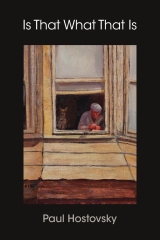Three Poems from Is That What That Is
Worcester
In Worcester, Massachusetts,
outside the Worcester Free Public Library,
there’s a line of homeless people
waiting to freshen up in the library’s
free public toilets. And the senior librarian
isn’t happy about it. How many will borrow a book
when they’re done in the toilets? she asks the junior librarian
who is returning a book of poems by Elizabeth Bishop
to the poetry shelf. Before she moved to Worcester
for the junior librarian job, the junior librarian
lived with her aunt in Greencastle, Indiana,
and didn’t even know how to pronounce Worcester.
As for the homeless people, they aren’t
happy about it, either. Some are heroin addicts.
And some are mentally ill. And some are both.
And some are neither. And some are here illegally
and trying to acquire English by distilling it
from the airwaves and the signage. And they would all
rather be reading their own books on their own
toilets in their own homes. Nevertheless, they love
the motion-activated faucets with sensors in them
where they need only hold up their empty hands to receive
the generous wordless warm egalitarian water flowing
over their wrists and palms and backs of their hands
like a blessing. And all of them, every last one,
would pronounce Worcester perfectly,
as a sort of benign library fine, if asked.
Poem
Some pronounce it poim.
Like it has an oy inside it.
The way an oyster
has an oy inside it. The way
all poems ought to have
a little oy veh
and a little oyez! oyez!
inside them.
Others pronounce it po-um.
Like it has an um inside it.
A thoughtful pause.
A caesura. A possum
that got run over,
its esses elided.
Me, I always say pome.
Like an apple or pomme
I want to bite into
because it has an om inside it,
a mystic and sacred
syllable I can’t wait to reach
and I have no patience
for all the diphthongs.
Privilege
Take, for example, the grass
in the suburbs of America,
how it forecloses the likes of
curly dock, tansy, clover,
creeping thyme,
buttercup, ragweed--
any raggedy brown
or blue or red or yellow
unruly thing
applying for entry here,
hoping to live and to flourish here--
all the so-called weeds,
all the beautiful wildflowers--
turned away, mowed down,
poisoned. And hasn’t it always
been this way, only the pure,
cropped, decorous green
grass and its offspring welcomed here?
But at what cost to all of us
this skewed sense of beauty
and propriety, this monochrome
monoculture with its monotonous
traditions of separateness
and supremacy, totally lacking
in any flavor or utility
or spirit? The dispirited grass,
asleep in its vast bed
of privilege, dreams of the invading
hordes of color, riots
of dandelion, chicory, purslane,
which all make fine eating
and live on the other side,
out in the waste places,
out along the roadsides,
not very far away
but far enough away
so that the lonely, privileged,
uninflected grass begins to feel
a profound sense of loss
and a profound sense of sadness
to think of the fine company
and the fine eating
of its despised neighbors,
all the brothers and sisters
whom it has never met
and does not know at all.
